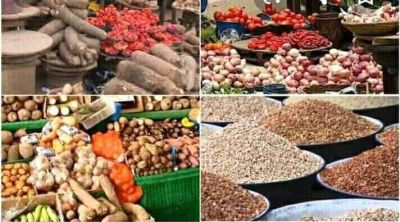Nigerians are complaining of high cost of food commodities occasioned by poor purchasing power.
Many breadwinners interviewed on Thursday said they can no longer afford to feed their families three times a day as the prices of basic food items doubled in the past few months and their source of income dwindled.
Some traders have attributed the high cost of food items to the inability of farmers to produce enough for domestic consumption while international borders remained closed. Others attributed the problem to the increase in the price of petrol and electricity tariff.
The complaint came at the time President Muhammadu Buhari convoked the meeting of the National Food Security Council (NFSC) where some of the stakeholders also raised the alarm of food shortage in the country and the consequences.
However, some of the attendees expressed optimism of overcoming the impending danger as farmers begun to harvest their produce.
Buhari at the meeting also warned Central Bank of Nigeria (CBN) not to give a penny to anybody who intends to import food items or fertilizer, insisting that Nigeria has the capacity to feed itself.
It’s tough time for the poor
A survey conducted on commodity price in Kano revealed that at the Dawanau World Grain Market, a 100kg bag of rice popularly known as Jamila is sold at N54,000 or more, while a 100kg bag of beans is sold at N21,000.
Similarly, a 100kg bag of old maize is sold at N22,000 and that of newly harvested maize is sold at N18,500.
A 100kg bag of millet goes for N20,000 and a 100kg of garri is sold at N18,500. An average tuber of yam goes for N650.
Findings revealed that prices of grains are higher in the North East, North Central and most of the states in the southern part of the country.
In Kano, Sagir Bello, a father of seven, said feeding three times a day is gradually becoming very difficult for most families as prices of every food commodity have been increased.
“Many people have resorted to buying what is known as broken rice, which is the last grade of milled rice and even at that, a measure sold at N550 before is now N950 and a measure of maize is now N600. To be honest, survival is becoming so difficult these days,” he said.
In the words of another resident, Ibrahim Abdul, “People now only look for what is affordable and available; prices of food commodities are so high and beyond the reach of the common man. I have two wives and five children and I earn a little above N40, 000. How do I survive in a situation where a 50kg of rice is sold at N26, 000?” he asked.
In Abuja, some artisans who spoke to our correspondent expressed concern over the sharp rise in food across various markets in the territory.
A bricklayer, Mustapha Ndako, who is a father of six children, said he used to buy a bag of guinea corn that lasts for a month but could no longer afford it.
“I only buy half of a bag these days and therefore my wife has to cut the ration we use daily. Besides, I have six children apart from the three children of my late brother who are staying with me…It is indeed a trying moment,” he said.
Ibechukwu Alfred, who is a vulcanizer, said: “six months ago, I used to buy a bag of rice and half a bag of beans and garri and keep them in my house. But these days I can’t afford it, I only take home what we would eat.”
At Wuse Market, a mudu of local rice is sold at N850, while a mudu of foreign rice is sold at N1, 200. Also, a bag of beans, which was sold at N18,000 in May, 2020, is now sold at N22,000.
Prices doubled in Lagos
At Ojodu mini-market in Lagos, the business hub of Nigeria, a bag of rice, which was hitherto sold for N18,000 is now N22,000 while a bag of foreign rice, which has been banned but still being smuggled in is sold at N30,000. Vegetable oil, which was sold for N11, 000 is now N14,000. Also, a 4-litre paint bucket of garri goes for between N700 and N1000. A 4-litre paint bucket of beans rose from N1, 500 to N1, 700.
Similarly, bread makers under the aegis of the Premium Bread-makers Association of Nigeria (PBAN), said on Thursday that the price of flour, a major ingredient for bread, increased from N10,500 per 50kg bag to N13, 500 per bag, sugar increased from N13,500 per bag to N29,000 and down to N19,000.
Why we’re promoting self -sufficiency – Buhari
Mr Buhari on Thursday directed Central Bank of Nigeria ‘’not to issue a kobo’’ of the country’s reserves for the importation of food items and fertilizer as the federal government rolls out the Economic Sustainability Plan and sets goals for National Food Security.
Buhari restated his earlier verbal directive to the apex bank at a meeting of the National Food Security Council at the State House, Abuja.
Buhari said that he would pass it down in writing that ‘’nobody importing food should be given money.”
He also directed that blenders of fertilizer should convey products directly to state governments so as to skip the cartel of transporters undermining the efforts to successfully deliver the products to users at reasonable costs.
He told private businesses bent on food importation to source their foreign exchange independently.
Daily Trust

